Amid the failed politics of Patriot missiles and F-35s, Moscow and Ankara’s blossoming relationship has left NATO and U.S. interests exposed.
Relations between Turkey and the West continue to face a number of challenges. The latest set of challenges, that culminated recently in a squabble over the purchase of American versus Russian weapons systems, are but mere symptoms of a much larger set of predicaments.
Many of these problems are being erroneously pinned on U.S. President Donald Trump, ignoring the fact that NATO-Turkish relations have been deteriorating since the early 2000s. From the first days of the War on Terror, Turkey has been a reluctant tactical partner to the West. This reluctance likely stems from the belief that Western engagement in the region does little to advance Ankara’s ambitions. Instead, the greater the Western presence in the Middle East, the greater the threat to Ankara’s ambitions. Such ambitions are namely the government of Turkish President Recep Tayyip Erdoğan.
This problematic relationship has now reached a new height. A series of shifts and what some see as outright betrayals have emerged.
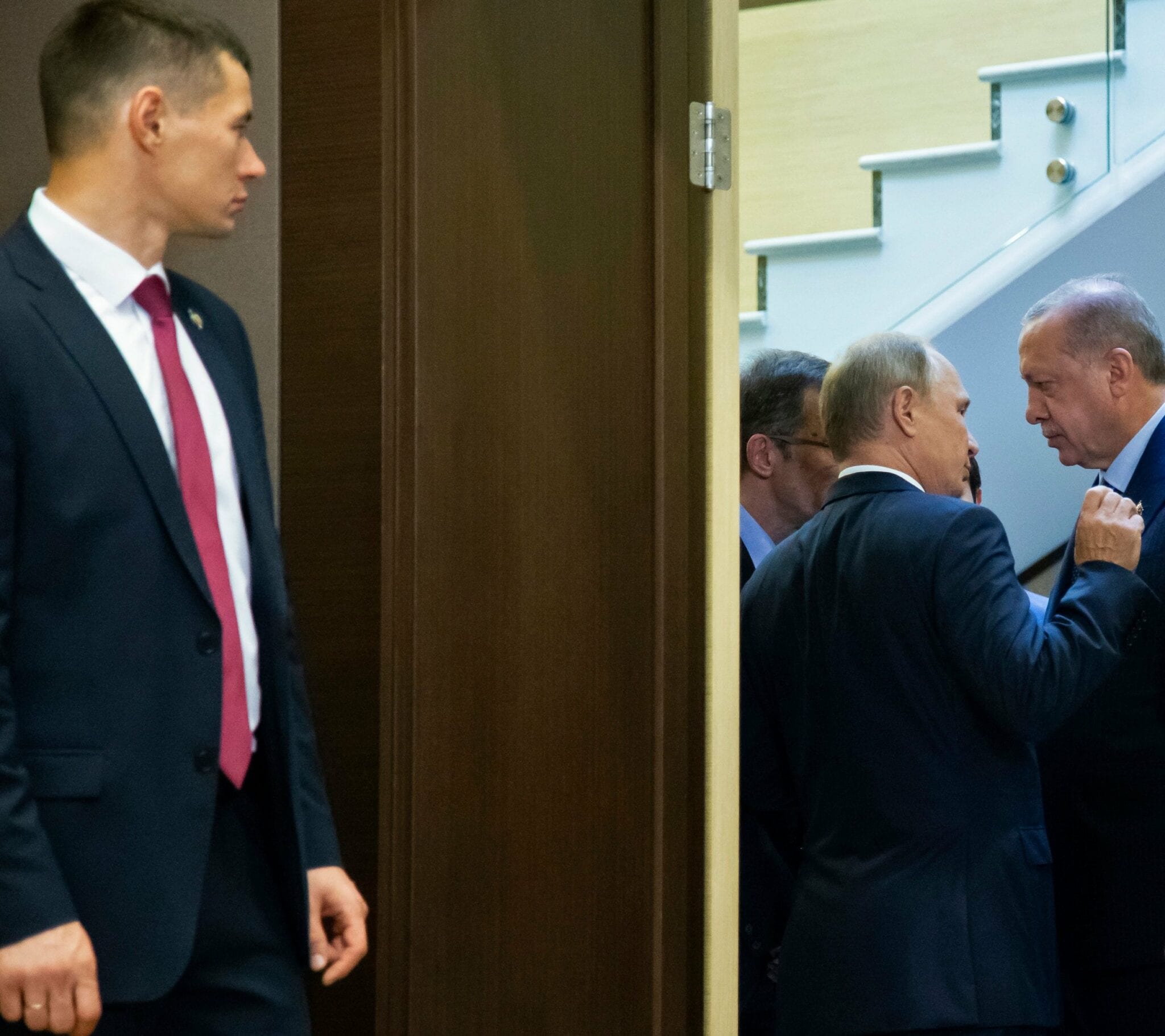
In response to these developments, Washington announced a few weeks ago that it would not allow Turkey to purchase the highly advanced, yet probably flawed, trillion-dollar boondoggle that is the Lockheed Martin F-35 Lightning II. This announcement, however, did not have the expected effect. Rather than crawling back begging for Washington’s forgiveness, Ankara ramped up its dialogue with Moscow over the purchase of the Su-27 derivate multi-role Sukhoi Su-35 (NATO codename Flanker-E) air superiority fighter jet.
None of this is surprising. It all plays into a much larger mosaic, of which few are aware of its full extent. Ankara’s strengthening of ties to Moscow comes in no small part due to the pragmatism Moscow employs when it comes to the ground truths in Syria, Libya and Iran, just to name a few places that Turkey has an active interest. Russia’s actions on the ground throughout the Middle East, and elsewhere, show that while Turkey’s regional ambitions can be viewed as incompatible with the West, they are certainly compatible, for the time being, with Russia.
In the Shadow of a Coup
President Erdoğan has in recent years engaged in an aggressive consolidation of power. His actions have fueled domestic and international concern about increasing authoritarianism in the country.
In July 2016, Erdoğan survived a large-scale coup attempt by members of the Turkish military. The perpetrators accused their president of being, among other things, undemocratic. In the immediate aftermath, which is still ongoing, the government detained tens of thousands, often on undisclosed grounds, and shut down a variety of businesses, schools and media outlets. Also detained were a large number of Turkish citizens affiliated with U.S. diplomatic facilities, including even janitors and other service personnel. Since the attempted coup, the Turkish military has lost a considerable number of its most qualified officers and strategists. In June 2019, a quasi-civilian court sentenced 151 people, mostly from the military, to life in prison for their involvement in the coup attempt.
Officially, the objective of this “Great Purge” was to root out anyone associated with the former Turkish cleric Fethullah Gulen, who is viewed by some as the polar opposite of Erdoğan. The U.S. has refused to hand over Gulen, and many Turks believe that Washington had some degree of involvement in the coup. These acts by the Erdoğan government come in no small part out of fear that another coup may be brewing, one that must be found and quickly and savagely brought to an end.
Odd Couples
To facilitate a harsh rule and approach to a country’s domestic scene, one must carefully select international partners. The West is no longer a suitable partner for such things. Perhaps it never was. During the 2011 Arab Spring movement, the author worked extensively with the leaders of Egypt and Yemen witnessing firsthand how weak, even dubious U.S. support was for its regional allies, partners that had found themselves exposed to populist movements.
Russia however, with its natural habit of nihilistic realpolitik and little interest in moral condemnation is often an ideal partner. There is little doubt that Moscow would be more than a willing partner if called upon to assist. Additionally, recent speculations have implied that a deciding factor in favour of purchasing highly advanced armament systems from Russia is that such systems would not have any built-in safety protocols against firing on your own air force jets, or those of your allies.
Turkey has a long history of not siding with Western interests. As is often the case, this is in large part due to ill-understood practicalities. The West is not always the most practical or united entity to deal with. The West also has a tendency to not understand the ground truths in the places it elects to engage with. The U.S. has become near infamous for this. While Turkey’s ruling government had at one time become known for being passive-aggressive, often offering snide remarks from the sidelines, in recent decades Turkey has moved from a reluctant ally to an active obstacle to Western interests. This has been mostly under Erdoğan’s rule.
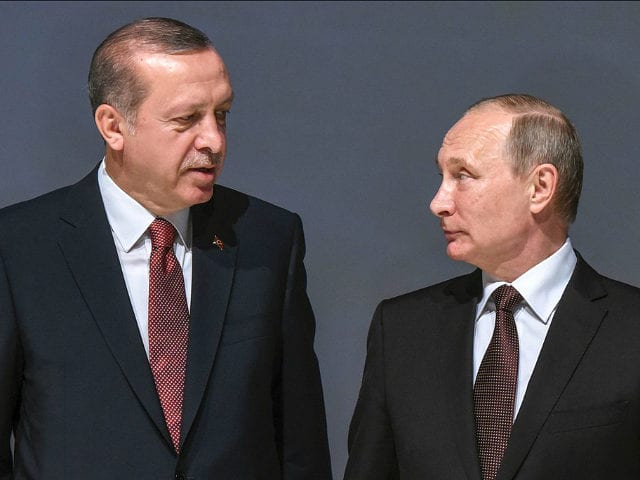
Turkey in NATO
Turkey’s importance to the North Atlantic Treaty Organisation is not just due to the nation’s geostrategic location. Turkey has the second-largest military force in NATO. A NATO without Turkey would be significantly weakened.
There does not presently exist a mechanism for suspending, much less expelling a country from the NATO alliance. The removal of Turkey as a NATO ally is unlikely. Erdoğan knows this. Western military operations throughout the upper Middle East remain heavily reliant on Turkey and its geographically vital position as the proverbial Gate to the East. The cost to NATO, meaning the cost to the U.S., of finding a replacement for Incirlik Air Base, a vital installation situated some 70 miles from the Syrian border, is both financially and politically immeasurable. Despite several willing partners, such as Greece and Jordan, such a shift is also unlikely. Having said that, it would not be a bad idea for NATO to at least remove its nuclear capabilities at Incirlik.
The War Against the War
Turkish reluctance as a NATO ally became particularly noticeable in the summer of 2002 as the U.S.-led coalition of The Willing to invade Iraq began taking shape. With the U.S. military and intelligence community having begun preparatory operations it was initially thought that Turkey would cooperate with a suitably shaped war plan. As a result, Turkish military leadership was given a seat at the planning table.
Turkish political and military support, however, was proven to be largely unavailable. Ankara had little to no interest in providing actual support for the coalition and its plans. No doubt this reluctance was in no small part because the Western plan relied heavily on swift-moving special operations forces, which would in turn rely on the humanitarian tactical landscape and some pragmatic alliances – namely the Kurds. This approach was one that Ankara could not adhere to.
Western special operations operators working closely with Kurdish assets was a deal breaker for Turkey. These Kurdish assets would gain immeasurable resources, tactical know-how and strategic benefits by their affiliation with the West’s premier fighters and intelligence operators.
Ultimately, Ankara feared that the Kurds would gain enough Western awareness and political support to further their quest for a sovereign nation under whatever titulary name and shape it might take. War has made stranger things possible.
In 2002 Ankara pitched to Washington a multi-decade plan that could alter the Middle East geopolitical and strategic landscape.
The Ankara Plan
Instead of the U.S. plan, Ankara and its military and intelligence leadership suggested alternatives more to their liking. This was made clear to me during conversations I had in 2007. At the time, then-Undersecretary of the Turkish Ministry of Defense General Işık Koşaner, and his colleague, Lieutenant General Necdet Özel, then-Commander of the 7th Corps and Deputy Commander of Training and Doctrine Command, told me that in 2002 Ankara had pitched to Washington an intelligence oriented operation that would disrupt Saddam Hussein’s and the Baathist rule of Iraq. It was sold as a multi-decade plan that could alter the Middle East geopolitical and strategic landscape, a highly cost-effective option that would see few Americans involved on a tactical level.
To the author, details of that plan appear very similar to the 1979-1989 CIA operation known as Operation Cyclone. Operation Cyclone had been deployed with great success against the Soviet presence in Afghanistan at an estimated total cost of some $6 billion. The proposed Ankara plan would have seen Turkey taking the same pivotal role that Pakistan’s Inter-Service Intelligence (ISI) had played during Operation Cyclone. It would have placed an undue amount of influence of Western interests in the Middle East at the hands of Ankara and would have sent Turkey’s pan-regional ambitions to unseen levels.
This is, at the very least, how Operation Cyclone played out for Afghanistan, the ISI and the Pakistani central government. No doubt there are still those in Turkey that believe such a solution would serve all interests and should have been implemented. The proposed Ankara plan only saw a predictable, tacit degree of consideration.
Instead, Washington and its coalition allies quickly saw fit to deploy more direct measures. Thus, by June 2002, Ankara and its military General Staff had already on multiple occasions refused entry for the CIA’s highly reputed counterterrorism field team. By early July 4th, the situation had reached a breaking point. The Turkish General Staff had yet again refused to allow the American intelligence team to enter Turkey, despite the fact that their destination was the NATO Incirlik Air Base. Ultimately, after a crisis meeting that same day, the counterterrorism team leadership decided it was necessary to override the Turkish refusal. The Show Must Go On.
Operation Hotel California
On the morning of July 7th, the team entered Turkish airspace after a brief refueling stop at a neighbouring NATO-membership nation and landed at the Western-military affiliated side of Incirlik. Ankara had not been told of the plan ahead of time. Mere days earlier, the team had seen reinforcements join their ranks from the U.S. Army 5th and 10th Special Forces Groups. Together, the CIA special activities team and their brothers from the Army would form the tip of the spear of the American tactical push into Iraq.
Nearly immediately after landing, the team received the necessary armaments and headed out towards the Turkish-Kurdistan border region. On July 10th, it crossed the Harburr River into Kurdistan. On the other side of the border, they would link up with Kurdish Peshmerga fighters and begin operations set to prepare the necessary tactical human landscape for the not-yet-decided-upon invasion. When they crossed the border, they initiated one of America’s most complex and dangerous covert operations to date.
Under the header of Operation Hotel California this group of men, along with their Kurdish allies would, throughout the initial tactical operations in Iraq, come to form the entirety of the northern force against Saddam Hussein’s forces.
As part of the group’s tactical operations, a series of false flag and false front operations were conducted. As part of a larger false information campaign carried out by the U.S. Army’s Psychological Operations (PSYOP) and Warfare division, the group conducted a deception operation to convince the Iraqis that the U.S. Army 4th Infantry Division would mount its primary assault into Iraq through Turkey. The plan to have the 4th Infantry Division enter the fray through the Turkish-Iraqi border had begun as part of the actual invasion plan, but was quickly rejected by the Turkish high command and thus abandoned by the U.S. command as well. The notion was, however, useful to keep alive as a rumour. This put additional pressure on the Special Operations field teams and their affiliated Kurdish militia groups tactical environment, putting their lives in direct danger, as the Iraqi military began to amass portions of its heavy armour and artillery in the area.
That this group would come to form the entirety of the northern flank against the Iraqi military was not planned. Instead, it had become a necessity. Within the months that followed Turkey would come to block scalable operations by the coalition from within the Turkish nation. The official fear was that the U.S. would initiate an additional northern front against Iraq from Turkey’s side thus forcing Ankara to take sides in a conflict it desired to be left out of.
As the Iraqi invasion plan quickly began to solidify, the Turkish political leadership attempted to throw yet another wrench in the Western war machinery. As 2003 began, Turkey’s parliament voted through a bill that would prohibit the U.S.-led coalition from opening a second front originating from Turkey. It also prohibited the use of NATO installations in the country from being used in “offensive matters” in regards to operations in Iraq. Ankara’s leadership did little to object to the parliamentary bill, instead giving its tacit support.
By March, mere days before the invasion was set to begin, the parliamentary decision allowed the Turkish military to prohibit the initial deployment of the 10th Special Forces Group from following their brethren’s path into battle via the Turkish border. In the days before March 20th, the day on which the invasion began, the 10th SFG group’s deployment had to be rerouted through the region. Instead of going through Turkey, it had to mount its assault from the Sunni Arab Hashemite Kingdom of Jordan, which also shares a border with Iraq. This meant that the deployment of troops, which had originally been scheduled to take four hours, would now take ten hours.
However, with March 20th looming ever closer, the writing on the wall was clear. The coalition would invade and Turkey risked being left behind. Thus, Turkey would eventually allow an increasing number of military operations to originate from Turkey. Midway through the initial stages of the invasion, Turkey would even turn its coat in the wind and join the coalition. This was done less out of interest of maintaining its alliance with the West, and more as a pragmatic measure to maintain its seat at the table.
As such, the remaining elements of the 10th SFG would be allowed to use Turkey as their staging ground, under the condition they would prioritise missions against al Qaeda affiliated group Ansar al-Islam fi Kurdistan (AAI) and its bases. Turkey viewed the AAI group as a potential threat against its interests in the border areas. Attacking them served the interests of all concerned parties and was part of the operational plan of Combined Joint Special Operations Task Force — North (CJSOTF-N), more commonly referred to as Task Force Viking. However, the allowance to use Turkey as a staging ground was only extended to small-scale and small-team operations. Larger-scale operations, such as the bulk deployment of Task Force Viking was not permitted.
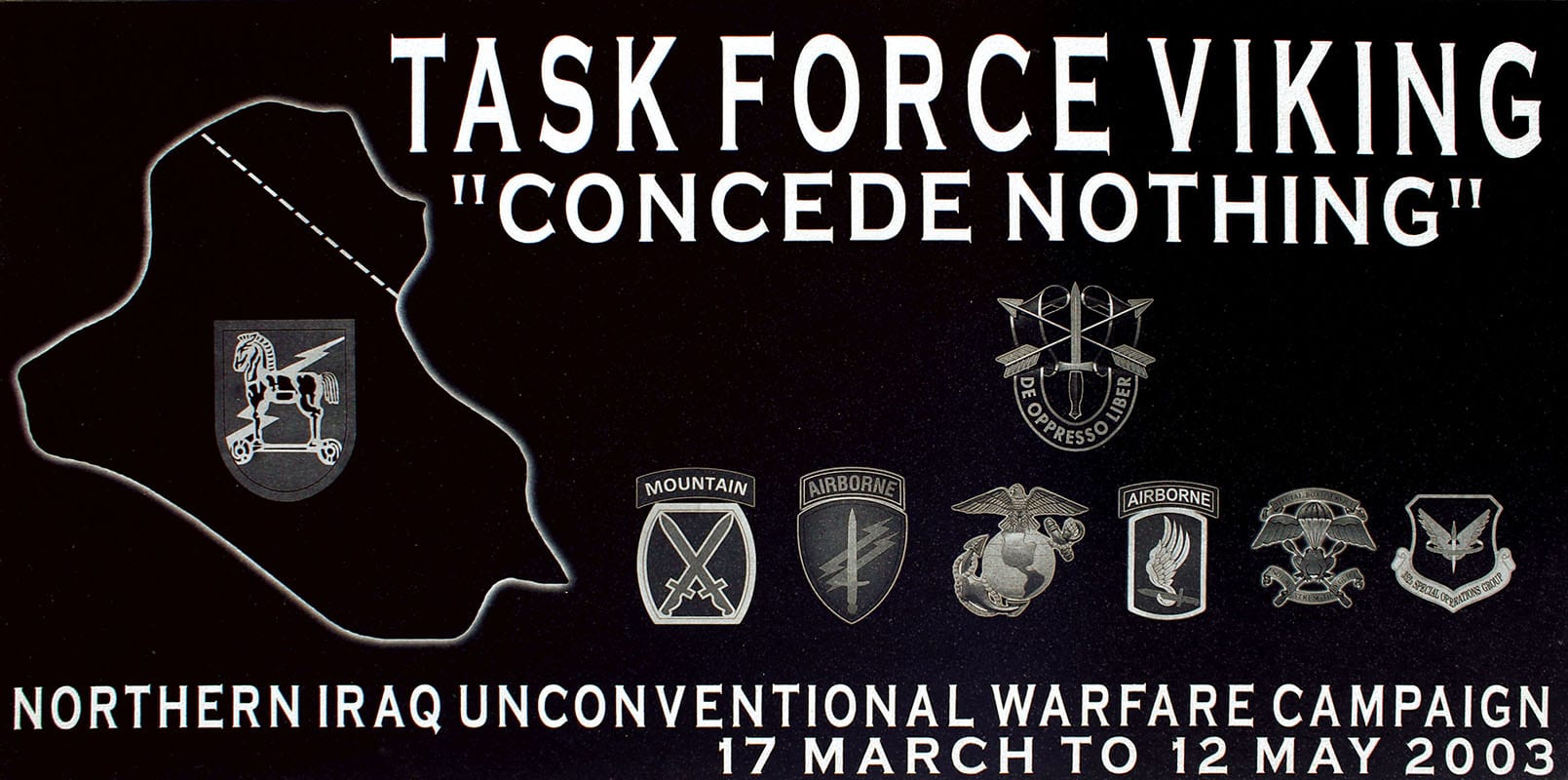
Ugly Baby
To avoid this restriction, Task Force Viking created a plan known as “Ugly Baby”. The Ugly Baby operation meant that coalition forces would engage in the longest infiltration by air mission since World War II, utilising Lockheed MC-130 Combat Talon I. The Ugly Baby operations infiltration mission aspect was initiated from Jordan, meaning that it would take the troops nine to eleven hours by air before they would reach their target destinations. The troops that initiated their operations out of Turkey were able to reach their target zones within three to five hours. The operation began in the early evening of March 20th, 2003.
As Task Force Viking landed, it was joined by some 60,000 Kurdish Peshmerga fighters from a variety of factions [1]. The Kurdish forces had received their training and were largely coordinated by the men from Operation Hotel California. It would take until March 23 before Turkey would allow air operations through Turkish airspace to be scaled up.
While the West engaged in special operations missions aided by the Kurds – who hoped their sacrifices on the battlefield would help make the Kurdish dream of a nation state a reality – the Turks covertly dispatched their own special operations troops. The Turks would train and equip the Turkmen Front with the goal of destabilising the Kurds and their militia capabilities. This, the Turks hoped, would allow them the pretext of entering the fray under the banner of a “peacekeeping” entity.
By mid-April, the Turkish plan had become apparent to the Western forces, and attempts were made to stop it. U.S. Army Colonel William C. Mayville Jr. began to intercept Turkish military forces operating covertly inside Iraq with the aim of escorting them back to the Turkish border.
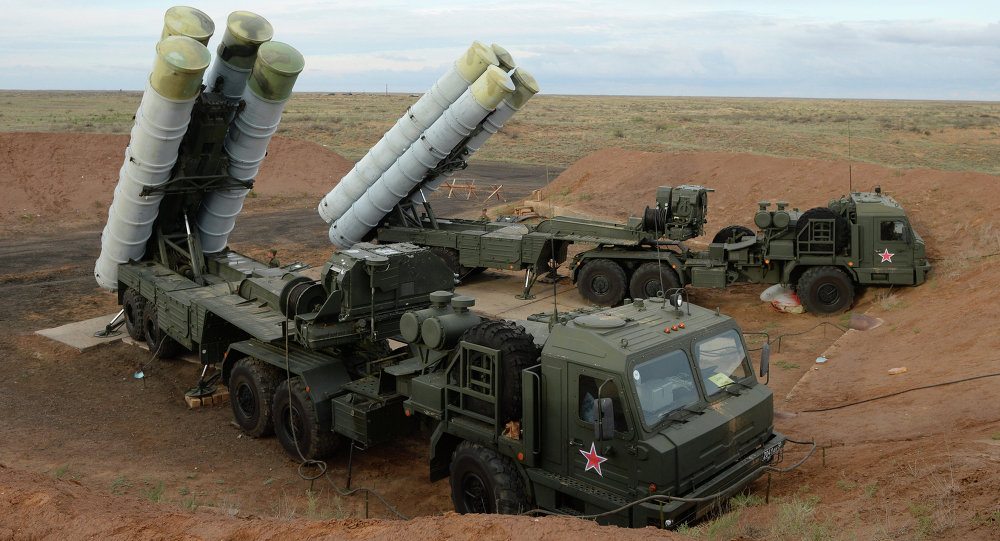
Master Disruptor
These are just some of the more direct cases. Throughout the recent turmoil in Syria, Turkey’s role has been that of a disruptor of Western interests, even if such disruptions entailed a high humanitarian price – one that Ankara no doubt has little qualms of letting Syria’s civilians pay. Of course, adherers to Ankara would likely say the same thing about the West.
Turkey has sought to play a grander role in the affairs of the region since the early-2000s, and as it has done so, its Western relations have deteriorated. This comes in no small part due to the Turkish leadership’s erroneous belief that in order to hold an increasing geostrategic role in the region it must side with Islamic values and play the role of a foe to the West.
Recep Tayyip Erdoğan, first as Turkey’s Prime Minister in 2003 and then as President in 2014, has largely built his base fanning the traditionalist, Islamist and nationalistic winds of Turkey, while promising a return to the glory of Turkish-led empires long gone.
Ankara has placed Turkey on a problematic political trajectory, one destined to see increasing political friction with Israel, along with virtually any and all Sunni Arab countries in the region. In fact, the only Sunni Arab nation that Turkey has as of yet not “rubbed the wrong way” is Qatar. The only reason for the absence of conflict with Doha is that Qatar has been quite willing to share what influence it might possess with Ankara. Qatar’s willingness, however, may come to an abrupt end in the coming months as pressure from Riyadh is building, seeking to coerce Qatar to fall in line with the United Arab Emirates and the Kingdom of Saudi Arabia’s leadership. While Riyadh and Abu Dhabi’s strong arm tactics are in direct conflict with Ankara’s lofty ambitions, Turkey has shown great reluctance to provide any meaningful support to Qatar.
Patriots Unite Us!
The U.S.-made MIM-104 Patriot surface-to-air missile (SAM) system is without a doubt among the most highly advanced pieces of equipment that any nation can invest in. The system is in use across the U.S.-allied realm, from Japan to the Kingdom of Saudi Arabia. Buying it means that you have access to world-renowned accuracy and reliability. But perhaps more important, buying the Patriot system shows your nation’s fidelity to the U.S.
Not buying it, well… shows something else.
As such, the U.S. has long sought to sell its MIM-104 Patriot system to Turkey. Turkey and its military top echelon need something like the Patriot system to enable the Turkish Air Force to enter the next level of Concept of Operations (CONOPS) and be able to engage in anti-access/area denial (A2/AD) strategies with their peers. Without it, a foe from the East or from the Levant – such as Israel or Iran – could violate Turkish air space with little penalty. Ultimately, in this day and age, with the battle for air supremacy being a large and deciding factor in any war, it is essential to have a contemporary/next-generation SAM system. Ankara knows this.
In other words, this would appear to be an easy sell. The U.S. has actually had Patriot systems deployed on and off in Turkey for years. The U.S./NATO controlled side of Incirlik Air Base received a Patriot installation featuring several batteries in January 1999. This Patriot system was deployed in light of a perceived threat increase against the base in the shape of SCUD missiles fired in relation to the Northern Iraq No-Flight Zone (NFZ) patrol flights which were operating out of the Turkish airbase. The Patriot systems, while deployed and active, were never fired and have remained at the base since.
The deployment of additional Patriot systems to Turkey was announced on December 4th 2012 in light of the escalating conflict in neighbouring Syria. The intent was to deploy them to protect strategically vital positions inside the country from potential missile and rocket attacks fired by non-state or state-supported groups operating from within the quickly spreading security vacuum in the Syrian-Turkish borderland areas.
In part, the “free” 2012 deployment of additional Patriot systems to Turkey was done so that the U.S. could win the $3+ billion Turkish long-range air and missile defence systems (T-LORAMIDS) bid, an ambitious programme which sought to install a nation-encompassing surface-to-air defence system, in 2013. The T-LORAMIDS programme was launched in March 2007 and was set to run for 5 years, with an announcement being made by year 6. Despite political pressure to award the $3+ billion bid to a NATO ally, the main candidate being the U.S., the bid was awarded to China Precision Machinery Import-Export Corporation (CPMIEC) and it is Hong Qi-9 (meaning “Red Banner-9), FD-2000 variation SAM system in September 2013. The Hong Qi-9 is an upgraded version of the Russian S-300 system. Its upgrades are believed to make it a hybrid variation between the S-300 and the S-400 systems out of a technological point of view.
The U.S. responded to the announcement by blocking funds which had previously been approved to integrate a Turkish SAM installation into the overall NATO defences. By 2015, the project appeared to have gone nowhere and was cancelled citing an undisclosed disagreement between Ankara and Beijing. The umbrella project T-LORAMIDS would, in turn, be cancelled a few months later in November 2015 without having seen a conclusion. The Chinese manufactured HQ-9, which had been intended for Turkey, would end up being shipped to Vietnam and Turkmenistan in exchange for Chinese companies gaining access to natural gas fields within these countries.
To further put pressure on Turkey to “do the right thing” during the summer of 2015 both the U.S. and Germany threatened to remove their in-country Patriot installations, thus exposing the nation to missile attacks from the uncontrolled areas in Syria. While the T-LORAMIDS programme would die the death of an orphan, Germany would still end up removing their Patriot installations. The trained German Patriot operators would, however, be redeployed along with Dutch operators to Turkey in October that same year to control the U.S. provided Patriot installations instead. This was however more likely due to issues with the installations rather than political causes. The U.S. Patriot installations have however remained.
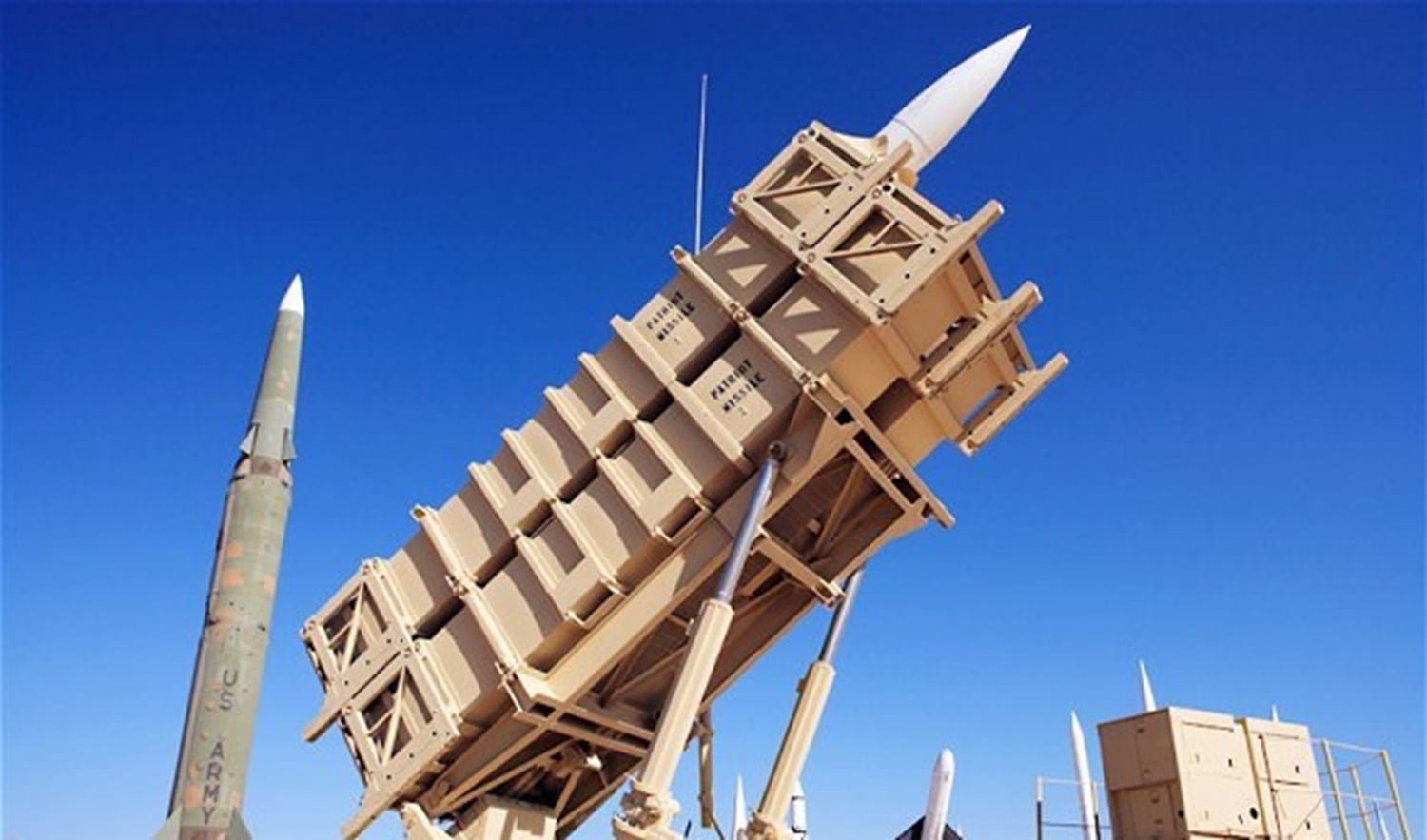
A Western-Asian Standoff
Since the demise of the T-LORAMIDS project, Washington has continued to put pressure on Ankara to “choose wisely”, meaning to buy the Patriot system. At the same time, Turkey has engaged in negotiations for a T-LORAMIDS-like solution with all available producers. As such, the Turkish military has engaged in talks with not just the U.S. and Russia, but also France and the UK among others.
By the early summer of 2018, the U.S. went on a full charm offensive towards the Turks as it became apparent that the talks with Moscow were proceeding. It was, however, a widely held belief by Washington insiders that Turkey would, in the end, go with the United States. Turkish officials did express concern that the U.S. Congress would not agree to a sale of the Patriot system, citing previous opposition for other arms sales to Turkey on multiple of occasions. The U.S. countered this concern by offering favourable discounts and lines of credit. [2]
By December 2018, the U.S. Defense Security Cooperation Agency (DSCA) notified Congress of a possibly impending sale of eighty Patriot MIM-104E Guidance Enhanced Missiles (GEM-T), sixty PAC-3 Missile Segment Enhancement (MSE) missiles and related equipment at an estimated value of $3.5 billion. To proceed, congressional approval was required. [3] By the time that Congress was able to reply and an offer was provided to the Turkish armament acquisitions contact, Turkish officials had informed DSCA representatives that a deal with Russia for a greater number of S-400s and related equipment was a “done deal” and that it was all had for $2.5 billion, a billion less than the price of the Patriot offering.
The Turkish government had first expressed interest in purchasing the S-400 system during the 2009 International Defence Industry Fair in Istanbul. It was at that point considered the best system of its kind. Since then the Patriot system, among others, has seen several upgrades. But so has the S-400. It has without a doubt remained one of the most advanced and competitive surface-to-air systems on the market. The Economist once, somewhat infamously, referred to the S-400 as “one of the best air-defence systems currently made”. It also features a more utilitarian design language, greater operational engagement range, a higher intercept speed and flight altitude, and a lower price point.
Turkish negotiators have specified very clearly that Turkey still could be interested in Patriot systems. But any purchase would be in addition to the S-400 systems from Russia, and the requirement of technical knowledge transfer stood firm.
That latter point, the technological knowledge transfer one, is key and has continued to haunt the negotiations between the U.S. and Turkey throughout. It is a problem that has remained since the early days of the T-LORAMIDS. Turkey wants to gain technological information and know-how not just to maintain these systems, but to develop and advance their own systems. One might add additional concerns to this fact when combined with the already mentioned ambitions of Ankara, and that Turkey has far-reaching ambitions of becoming a premier global armaments manufacturer to support that ambition. This no doubt makes Turkey’s NATO allies less than enthusiastic about co-production and technology sharing.
It is not unlikely that it was the technological knowledge transfer point that made the previous purchase of the Chinese Hong Qi-9 doomed to fail in 2015. According to Douglas Barrie of the International Institute for Strategies Studies in London, it is unlikely that the Chinese were able to hand over the technological know-how that the deal had stipulated. The S-300 design is owned by the Russian State and Beijing may not even possess the necessary knowledge base, much less been able to transfer such information without permission from Moscow.
It appears to be a straightforward, yet insurmountable problem. Fundamentally it comes down to two simple truths. The first is that Ankara wishes to understand what it is that they are buying and using. The second and more important truth is that Washington understandably does not trust Ankara. Considering the recent history in Iraq, events inside Syria, and overall moves by Ankara in the Middle East region — it is hardly surprising that Washington does not trust Ankara.
There are few indicators that Ankara will give in on the point of technology knowledge transfer, and the same can be said about Washington. A Western-Asian standoff if there ever was one. Combine this with Ankara’s ambition, and it does indeed make sense that Turkey went the way of Moscow. Russia is more than willing to not just play the role of a disruptive power but to also sell arms to just about anyone.
Technology transfers are not uncommon in weapons deals with regional powers that have a well developed military-industrial complex. It is indeed part of the package. There are however levels of technological transfer, and it is unclear just how vertical Russia’s technological transfer offering is at this point. Even Moscow is hesitant to provide full technological transfers to just anyone. Nonetheless, with Ankara, one supposes that the ultimate award would be grand enough to warrant any inherent dangers with doing full vertical level business with Erdoğan.
As part of this, the Turkish military has stated that it intends to be a partner with Russia as they jointly develop the next generation SAM system, the S-500.
Another entity that appears willing to chance it that Turkey’s ambitions will not come back to haunt the West is the Italian-French consortium Eurosam. Eurosam has been in cooperation with Turkish armaments producers Aselsan and Roketsan for four years with the ambition of creating a Turkish-designed SAM system. That system is believed to be ready for initial testing by October 2019.
To this day, the majority of actually-installed SAM systems in Turkey remains to be on-loan Patriot systems from the United States. The French Government, however has also installed the French-designed and developed SAMP/T system on at least two military sites inside the country.

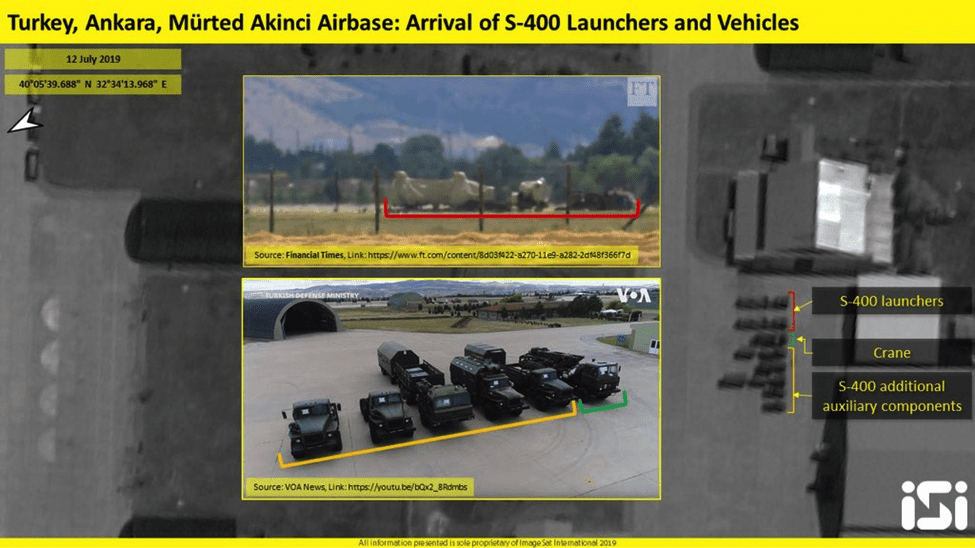
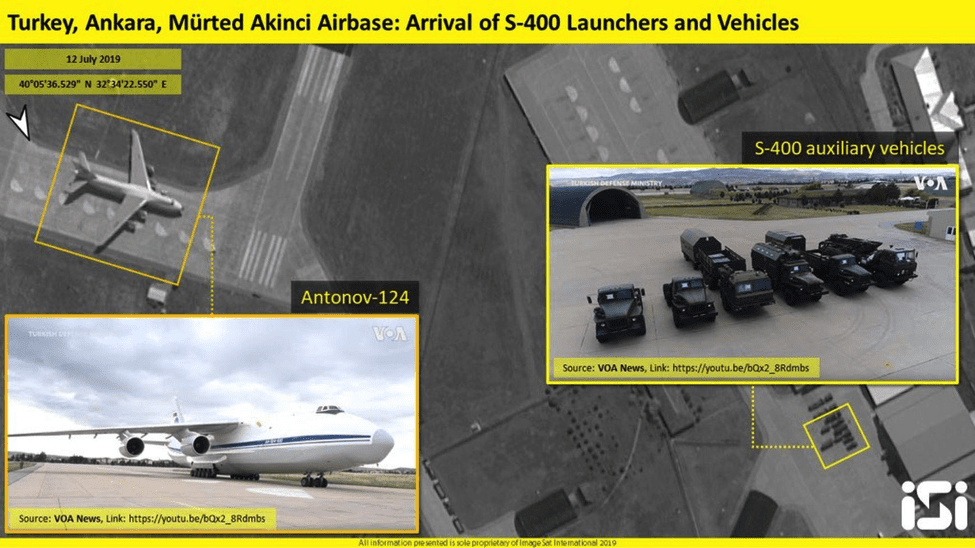
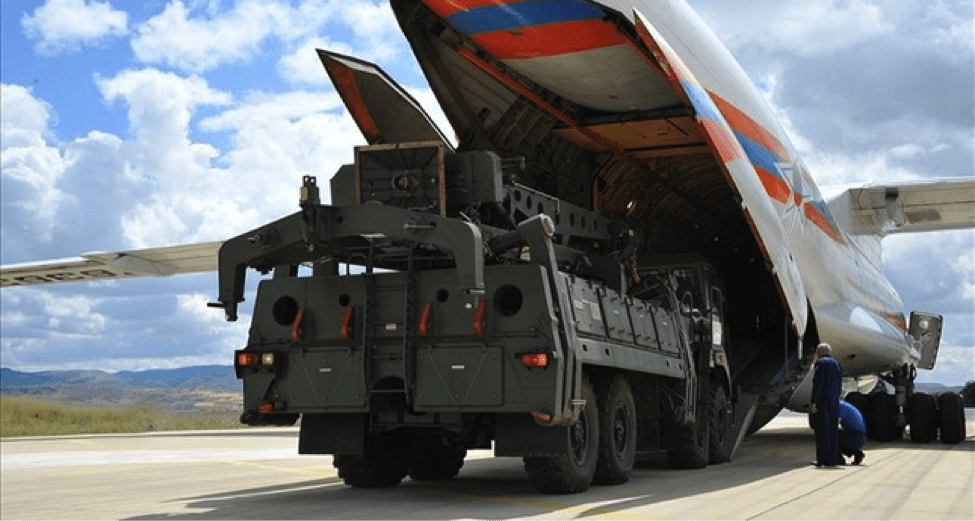
In The Danger Zone
Turkey has been set to receive more than thirty Lockheed Martin F-35A Lightning II stealth jet fighters from the U.S. by the end of 2022. Public statements have indicated that the country was to purchase a total of 120 F-35A’s. That would make Turkey the biggest customer, bar the U.S. of course, of the F-35 program. In fact, the first four F-35As were handed over to Turkish Air Force representatives during a ceremony at the Lockheed Martin plant in Fort Worth, Texas on June 21st, 2018. Two of the planes were flight-ready at the time. Those two were flown to Luke Air Base in Arizona, where the members from the Turkish Air Force would begin training on the new plane.
That ceremony was likely a bittersweet event for the ranking Turkish air force officers. The F-35A’s were intended to be delivered to Turkey by early autumn, but that was not to be. U.S. lawmakers had on a number of occasions threatened, either directly or indirectly, to ban the delivery of the already purchased F-35 jets to Turkey, and expel participating Turkish companies from the programme entirely.
On July 19th, 2018, the U.S. Senate passed through a vote which blocked the delivery of F-35 fighter jets to Turkey. This meant the Turkish officers in the U.S. could only tacitly receive the planes, and only to train with, inside the U.S.
The reason for the ban of delivery was a fear that Turkey would trade F-35 secrets with Russia, either as part of the ongoing negotiations with the Russians, or if the deal was completed as part of a new alliance with Moscow. The deal to purchase the S-400 system from Russia was described in late June to be done, but the Turkish surface-to-air system purchases had already seen many false starts, and the world largely saw the deal as belonging in the category of soft and non-binding arms deals so often signed between nations in the interest of political expedience. In May 2017, one such category defining arms deal had been signed between the U.S. and Saudi Arabia with a stated total value of $350 billion over ten years.
The threat of being excluded from the F-35 programme was one that had an edge to it. A part of Turkey’s partnership status agreement in the F-35 programme is that Turkish defence contractors would provide some 937 individual parts necessary to make the F-35A plane airworthy. Additionally, select Turkish Air Bases were intended to function as part of the F-35 maintenance support backbone for European NATO allies. In May 2013, Lockheed Martin declared that Turkey was projected to earn $12 billion from licensed production of F-35 components alone.
By July 12, 2019, the first installment of Russian S-400 missile defence systems arrived to Turkey by way of air transport, utilising a Russian Air Force strategic airlift quad jet Antonov An-124 Ruslan. Almost immediately the U.S. threatened Turkey with sanctions under the “Countering America’s Adversaries Through Sanctions Act” (CAATSA). This was followed on July 17th with Turkey being dropped, officially suspended, from the F-35 programme.
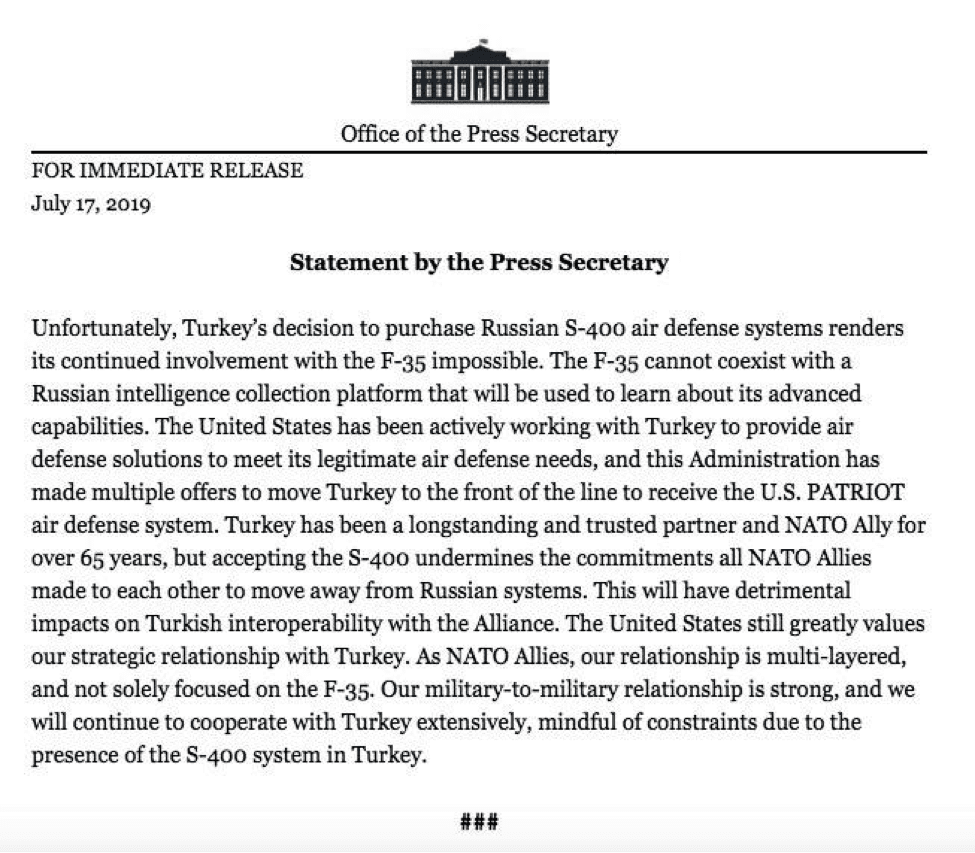
It has not yet been divulged how, or when, the U.S. will return the over $1 billion of Turkish investments into the F-35 programme, or if Lockheed Martin has been able to source alternative providers of the some 937 necessary parts that Turkish manufacturers were providing the programme. Reports made before the events otherwise indicated that a Turkish expulsion from the programme could delay scheduled deliveries by upwards of two years.
On July 18th, a day after Washington announced the removal of Turkey from the F-35 programme, Sergei Chemezoc, the head of the Russian state-owned armament manufacturer Rostec, stated that Russia is ready to supply Turkey with Su-35 fighter jets to replace the absence of the U.S. F-35A deliveries. Ankara and Moscow have since been discussing this possibility.
The model that the Turks are interested in is the Sukhoi Su-35 Flanker-E, also known as the Su-35S. A fourth-generation plus, or even fourth-generation plus-plus super manoeuvrable jet fighter. Judging by what analysts and observers have stated, it appears to be at least equal, if not superior, to its Western competitors. Its development began in 2003, with the first prototype completed in 2007 and production starting in 2009. More information about this jet, and how it stacks up against the F-35, the F-22s or even the European allied alternatives can be had in Sebastien Roblin’s National Interest article “Airway: Russia’s Dangerous Su-35 vs. America’s F-22 or F-34 (Who Wins?)”
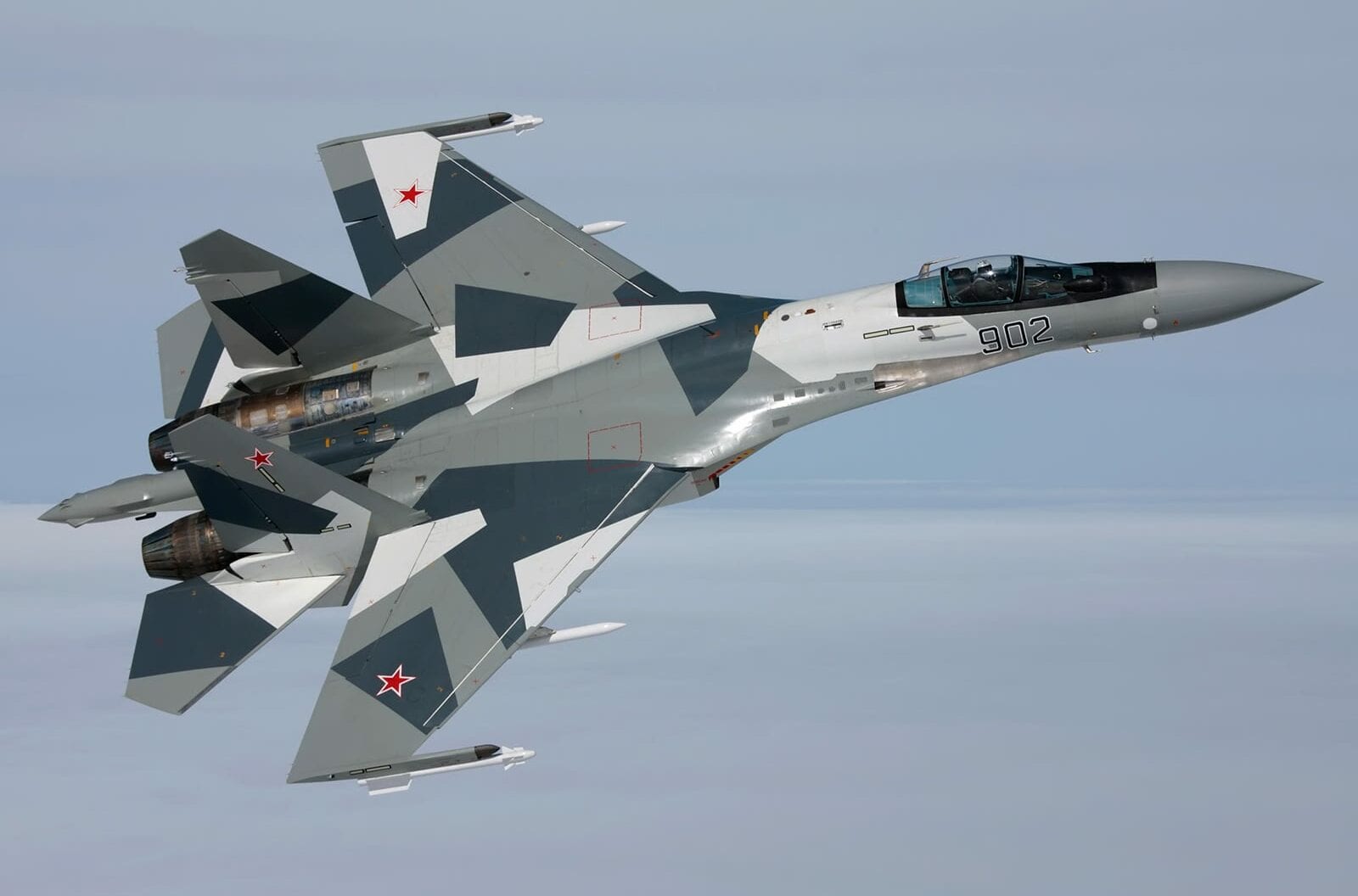
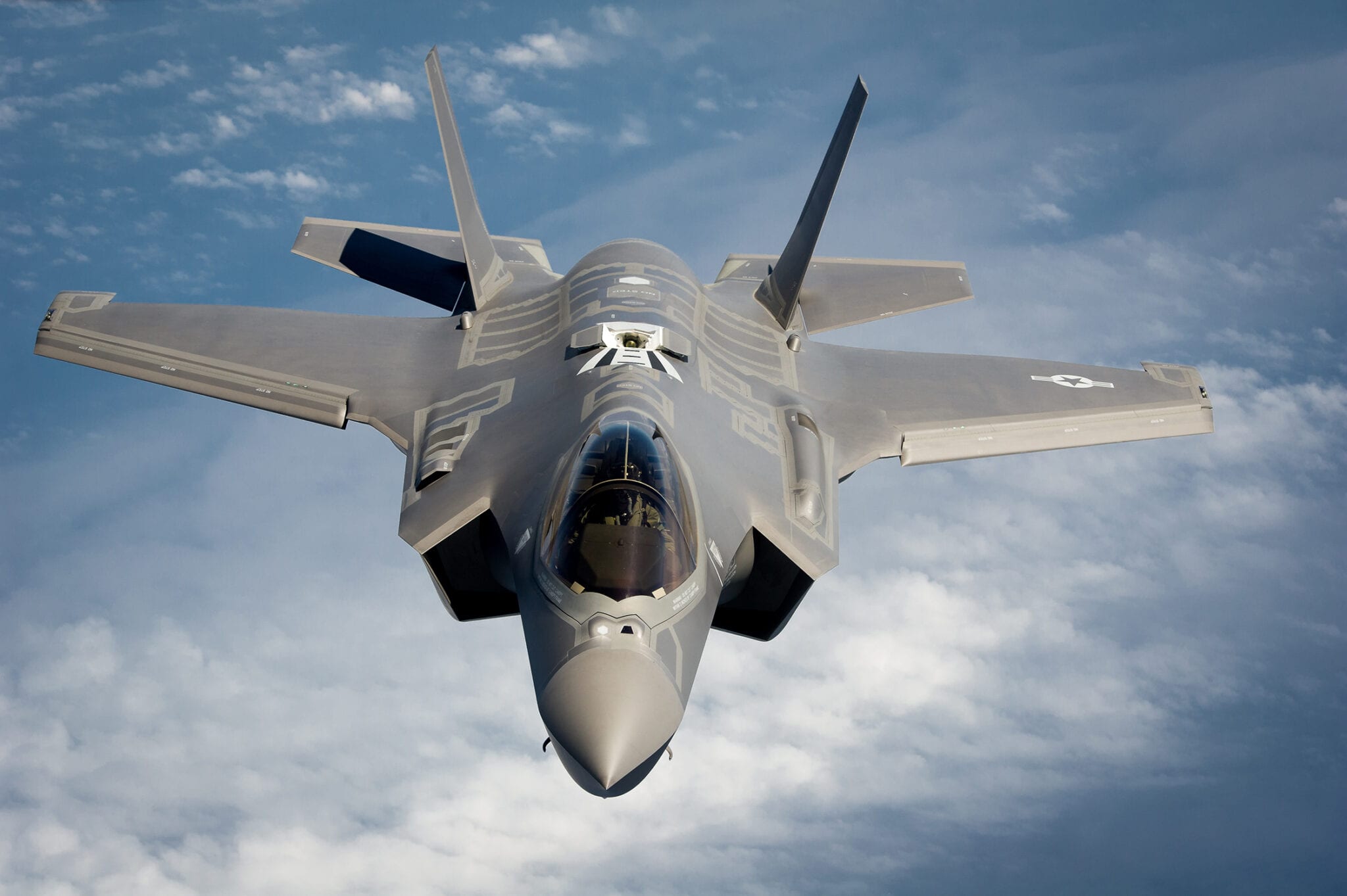
It not unlikely that the S-400 purchase, and the follow through by Ankara, was at least to some degree part of a larger plan to do more than just obtain a suitable missile defence system. Forcing the U.S. to agree to an acceptable level of Patriot-affiliated technology knowledge sharing, and forcing a solution to the F-35 conundrum are also part of the plan. If an F-35 solution was not forthcoming then that too would present Ankara with the option of forcing Washington to release Turkey from any contractual obligation regarding the controversial fighter jet. This could be further spun into not just giving Ankara more credit with Moscow, but aiding in its regional ambitions as showing one who stands up against Washington.
Such gambits often work well in the region.
Those credits with Moscow and the perspective these events helped cement will no doubt come to help strengthen Ankara’s leadership position in the soon-coming dialogues with Tehran and Damascus over the future of the upper Middle East. The region is seeing several underlying socio-dynamic changes and is poised for a change in power dynamics. The Damascus coalition has emerged as largely victorious, allowing Tehran to further solidify its influence and operational capabilities throughout the region.
These changes have all been at the expense of Riyadh, which has predictably begun to lose what lustre it had with its Western audience. Meanwhile the United Arab Emirates (UAE) is quickly emerging as the region’s Sunni éminence grise, a true Machiavellian operator.
Ankara remains uniquely positioned to utilise these new power dynamics, now without having to worry about Washington’s meddling. Indeed, Washington appears to have quite willingly helped assist a well solidified Ruso-Türk Geostrategic alliance to take form.
Indeed, some, like my dear friend and colleague, U.S. Army Colonel (Ret.) Norvell DeAtkine would argue that Western-Turkish relations are even more endemic than what I have described.
John Sjoholm, for LIMA CHARLIE WORLD
[Edited by Anthony A. LoPresti ]
[Subscribe to our newsletter for free and be the first to get Lima Charlie World updates delivered right to your inbox.]
John Sjoholm is Lima Charlie’s Middle East Bureau Chief, Managing Editor, and founder of the consulting firm Erudite Group. A seasoned expert on Middle East and North Africa matters, he has a background in security contracting and has served as a geopolitical advisor to regional leaders. He was educated in religion and languages in Sana’a, Yemen, and Cairo, Egypt, and has lived in the region since 2005, contributing to numerous Western-supported stabilisation projects. He currently resides in Jordan. Follow John on Twitter @JohnSjoholmLC
Offline References:
[1] Neville, Leigh, Special Forces in the War on Terror (General Military), Osprey Publishing, 2015 ISBN 978-1-4728-0790-8, p.9
[2] Department of Defense, FY19 NDAA Sec 1282 Report, Status of the U.S. Relationship with the Republic of Turkey, Unclassified Executive Summary, November 26, 2018.
[3] Congressional Research Service, Turkey: Background and U.S. Relations In Brief, Unclassified, July 9, 2019.
Lima Charlie World provides global news, featuring insight & analysis by military veterans, intelligence professionals and foreign policy experts Worldwide.
For up-to-date news, please follow us on twitter at @LimaCharlieNews
In case you missed it:

![Blossoming Russo-Turkish alliance leaves U.S., NATO behind [Lima Charlie News]](https://limacharlienews.com/wp-content/uploads/2019/07/Russia-Turkey-alliance-leaves-U.S.-NATO-behind.png)

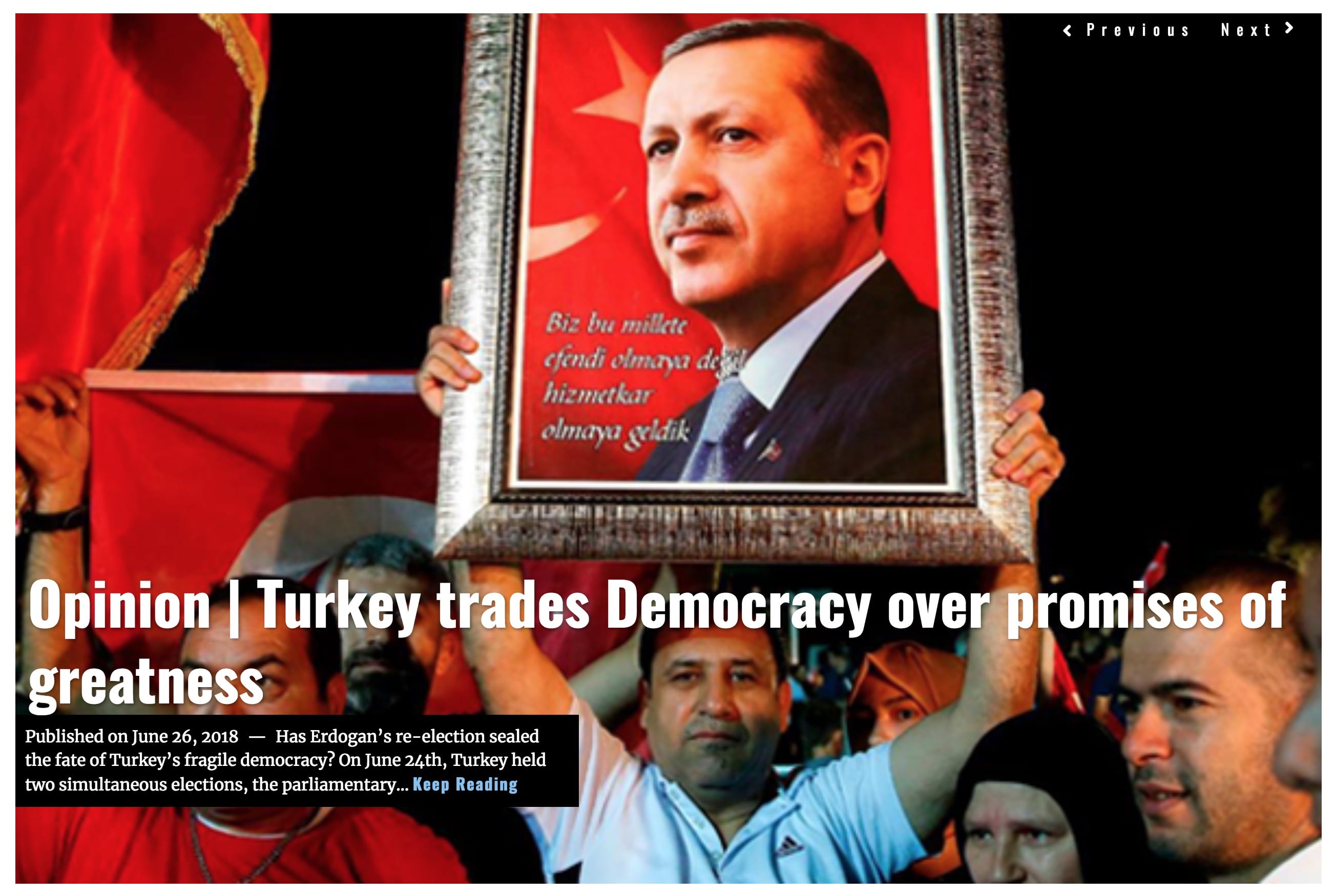
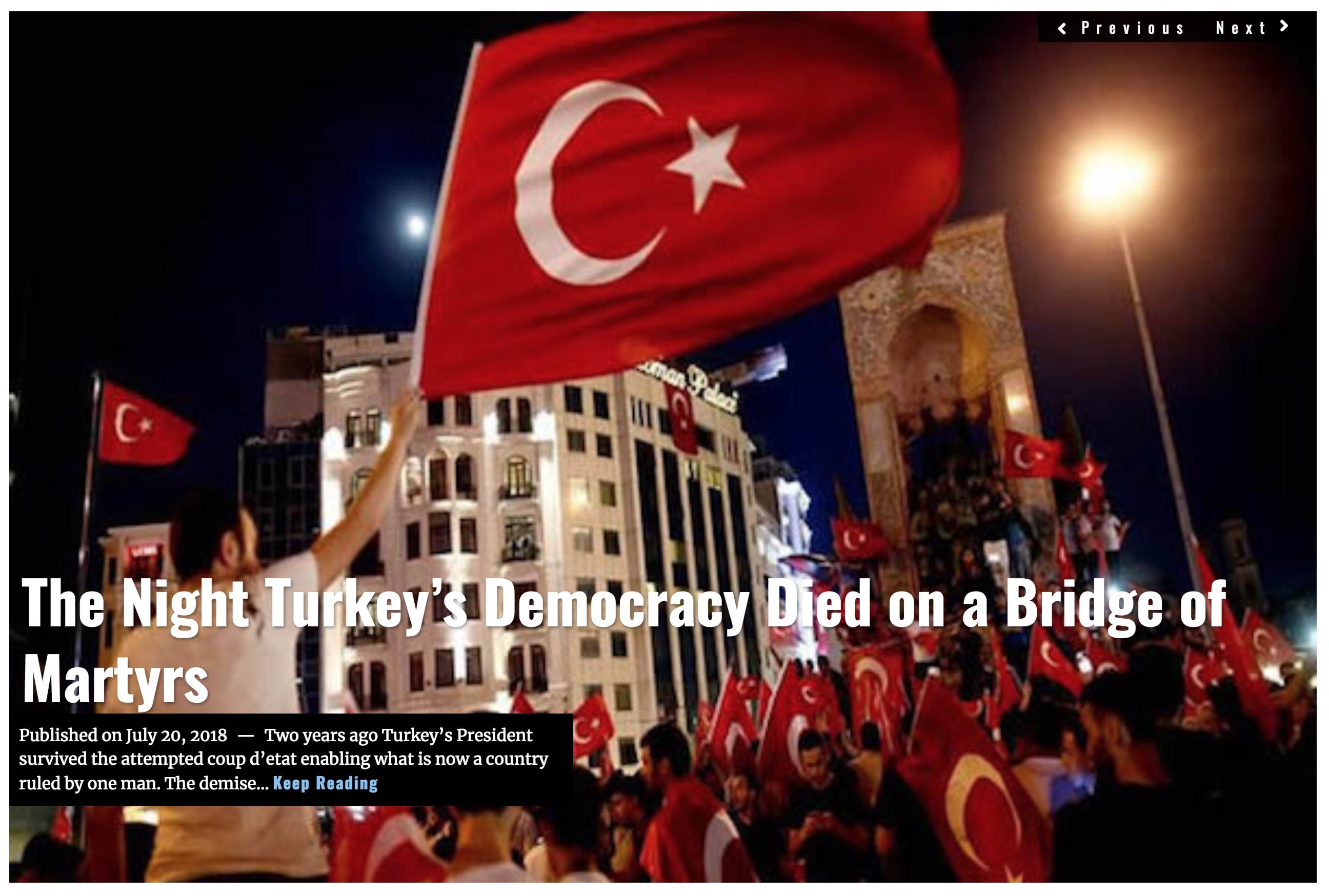
![Image Russia and China’s 'hybrid warfare' - Does the West even care? [Lima Charlie News]](https://limacharlienews.com/wp-content/uploads/2019/04/Russia-China-Hybrid-Warfare-02-480x384.png)
![image NATO’s value can’t be measured in nickels and dimes [Lima Charlie News]](https://limacharlienews.com/wp-content/uploads/2019/04/NATO-Trump-0005-480x384.png)
![Image Murder, genocide, politics and the almost surrender of Radovan Karadžić [Lima Charlie News][Lima Charlie World]](https://limacharlienews.com/wp-content/uploads/2019/04/Radovan-Karadzic-001-480x384.png)



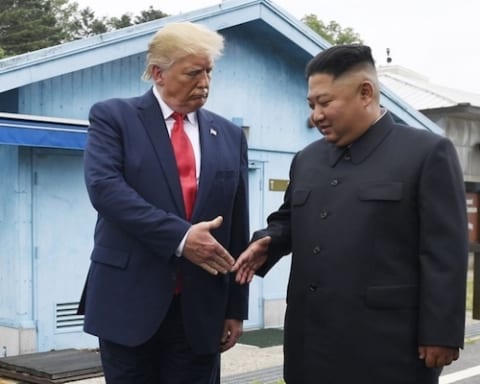
![Image What exactly is the extent of Russia’s influence on North Korea? [Lima Charlie News][Photo: Yuri Kadobnov]](https://limacharlienews.com/wp-content/uploads/2019/05/What-exactly-is-the-extent-of-Russia’s-influence-on-North-Korea-1-e1557115659181-480x384.jpg)
![Image Russia and China’s 'hybrid warfare' - Does the West even care? [Lima Charlie News]](https://limacharlienews.com/wp-content/uploads/2019/04/Russia-China-Hybrid-Warfare-02-150x100.png)
![image NATO’s value can’t be measured in nickels and dimes [Lima Charlie News]](https://limacharlienews.com/wp-content/uploads/2019/04/NATO-Trump-0005-150x100.png)
What happened with the CIA agents that fled to Seria in a millitary helecopter after the failed coup?
LOOK. Turkey is not against the West or East or South or North, Turkey actually middle of it all, and that gives them unique position in the World and possible a Balance maker . I know US and Israel like to divide the World and keep the military conflicts going. But Turks are tired of so you call Western wars in their borders or anywhere else in that matter. Just bz US and Israel decides Russia or Iran or China is an enemy Turks do not have to fallow that none sense. independent secular Turkish state is in the benefit of everyone and adds to World Peace. and I think every decent country who wants peace and prosperity should stand behind the Turks.